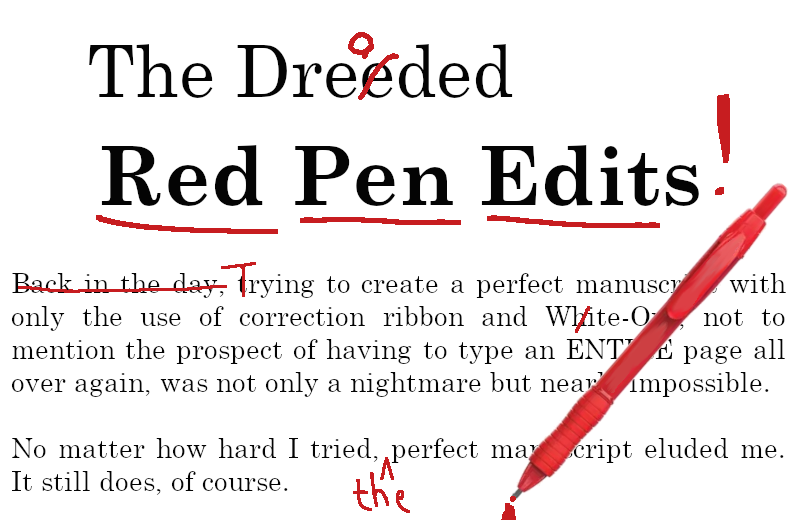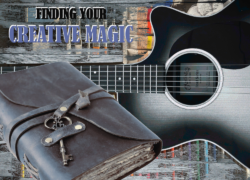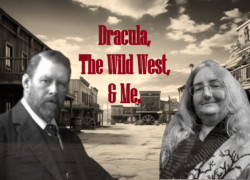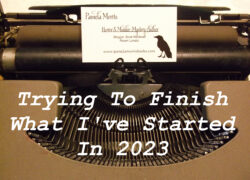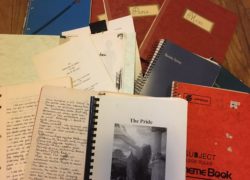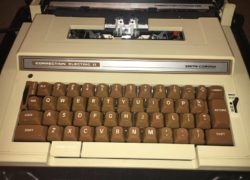I’m in the midst of editing my third Paranormal Murder-Mystery and fifth novel set in Barnesville, the fictionalized version of my hometown. I’m in a red-pen frenzy. Poor thing, some of the pages look as if they’ve been bled all over, appropriate considering the cause of death in this one, I suppose. Two of my pre-readers have gotten back to me with ideas, questions, and/or corrections/typos they may have found. Bless them! The thing would be even more of a mess than it currently is without their input.
It took decades for me to be comfortable having other people read my writing work. My teachers saw my work, and my parents read some of my stories, but the older I got, the harder it was for me to share and ‘face the music’ that are corrections.
When my first husband started reading for me, it was a nightmare! Not because he ridiculed or made fun or told me how horrible I was, but because he dared find typos and misspellings and point them out to me. Oh! The! Horror! What the hell was he thinking telling me I’d made a mistake?! Has he any idea how much carbon paper costs? Remember carbon paper? No? Oh, well … ahem. That tells how old I am. In retrospect, my outrage was at MY mistakes, not him trying to help me improve the quality of the work. Fortunately, my new husband doesn’t have to endure me getting all ticked off when he finds errors in my work. I actually provide him with a red pen when I hand over a manuscript in the hopes that he’ll use it.
Trying to create a perfect manuscript with only the use of correction ribbon and Wite-Out, not to mention the prospect of having to type an ENTIRE page all over again, was not only a nightmare but nearly impossible. No matter how hard I tried, the perfect manuscript eluded me. It still does, of course.
I tend to write in incomplete sentences. Depending on the story and the feeling I’m trying to convey, sections can often look more like disjointed lines of poetry than cohesive prose. A sample from my short story In The Pines that I completed last year looks like this.
Stella rested her forehead on her drawn up knees, squeezed her eyes shut, felt the tears slip down her cheeks, and listened.
And listened.
And barely breathed.
And didn’t move,
– except for the shivers that trickled through her limbs, not even when she felt the tiny feet of beetles and centipedes and spiders tiptoe across her skin,
not when the heavy footfall and grunting breaths drew close, panting,
not when the smell of burnt hair and flesh creeped high into of her nose.
Do not move.
Do not even think about moving.
Something cold and damp wiggled over her ankle. Stella clenched her jaw and fists.
In my creative mind, there are reasons for this unusual, somewhat poetic format. To me, it sets a certain pace, forcing the reader to not just pause, but to stop. Don’t move. Don’t breathe. Wait. It’s all about the timing and how I am reading and hearing it in my writer’s mind. It’s a far cry from grammatically correct – but, neither is most poetry I’ve read.
An editor’s nightmare? Perhaps.
I’m not against most of the suggestions I’ve been asked to consider by editors or first readers. I’m told a good editor doesn’t want to impose their style over that of the writer. Their job is to make it better, but I’d argue that even the best editors, especially ones who deal in short stories and anthologies, maybe don’t know the individual voices of the writers they’re working with well enough.
Does seeing one painting by an artist truly show anyone the painter’s style? Does hearing one song completely portray the entire repertoire of a musician? Does a single recipe from a chef’s cookbook define all their dishes, or does one film prove or disprove the skills of its director? A single book, be it a novel or short story, certainly does not represent an author’s full voice or style. Even well-established authors that I have known, read, and loved since my teen years have put out, in my opinion, some real stinkers.
If you’re a budding author and hope to get your work out there for others to see, the first thing you need to know is, not everyone is going to like your story. Some folks are going to absolutely HATE IT!!! Others will be, “Meh,” and then there will be the ones who really enjoy what you’ve created. Don’t let the haters and the meh-ers drag you down. Don’t let the editor, whoever that may be – a professional or your neighbor who’s a retired high school English teacher – crush your creative spirit. Each and every one of the people who read the story, are helpers in fine tuning your creation – yep, even the haters. Haters gonna hate, don’t worry about them or let their opinions keep you up at night.
I have yet to find my ‘perfect editor’, the one who truly gets where I’m coming from. I don’t think such a person exists. I’ve only worked with a handful, and they each have their own style. Some have been so hands-off I’m still wondering how they could dare call themselves ‘professional’. Seriously, not one typo? Not one suggestion? Basically, they left it up to me to re-read my own work to double check it was all okay – as if I hadn’t already done that a myriad of times before sending it to them. Others, well, they wanted to correct or change every comma, every semicolon, every incomplete sentence and at times it felt like they were rewriting the entire story in their voice instead of mine.
I try to be flexible and open to all their constructive suggestions and criticisms – those that could be bothered to give any – in the hopes of making my work more palatable to the masses. I don’t want to be that nightmare author who refuses to accept any input at all, especially if I’m getting paid for that piece of work.
I also don’t want to be an author whose work is full of typos and misspellings! That’s a HUGE turn off no matter how understanding I am of the process of seeking perfection. That’s also why I always give an author a second chance, sometimes even a third. If I don’t care for the first of their works I’ve read, maybe I’ll like the next. Nor do I expect everyone to like or understand some of my rather unconventional formatting choices.
But some folks do.
And that’s cool –
editing nightmare or not.
What I’ve Been Reading This Month:
From Twisted Roots by S.H. Cooper – short story collection
Malevolent Nevers by Tom Rimer
Movies I’ve Enjoyed This Month:
Willow Creek (2013)
Witch Hunt (2021)
